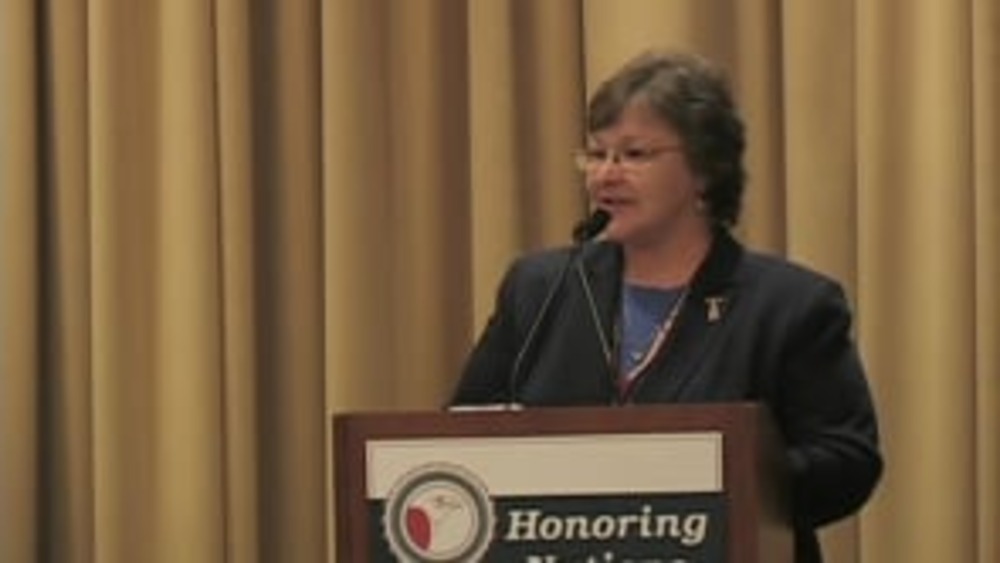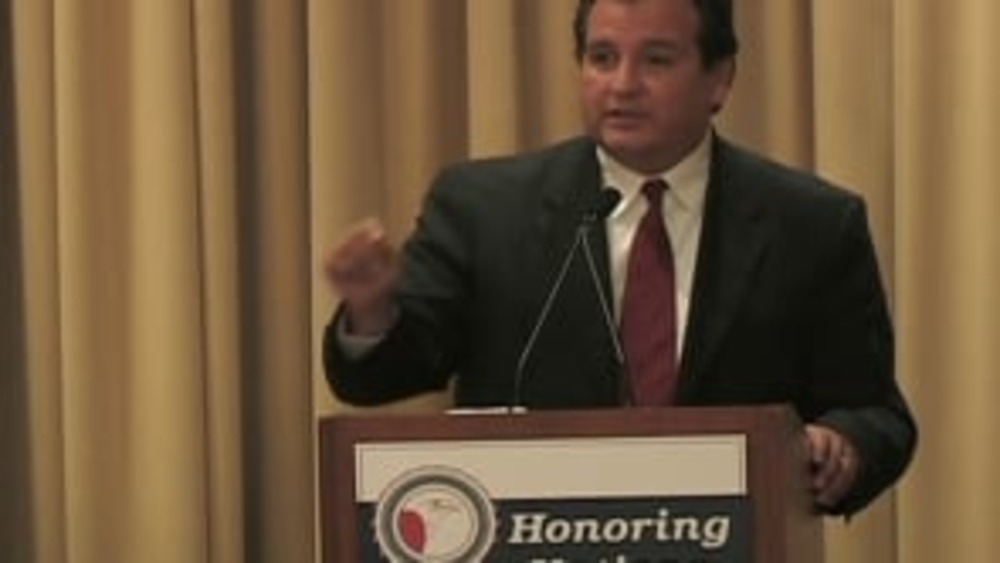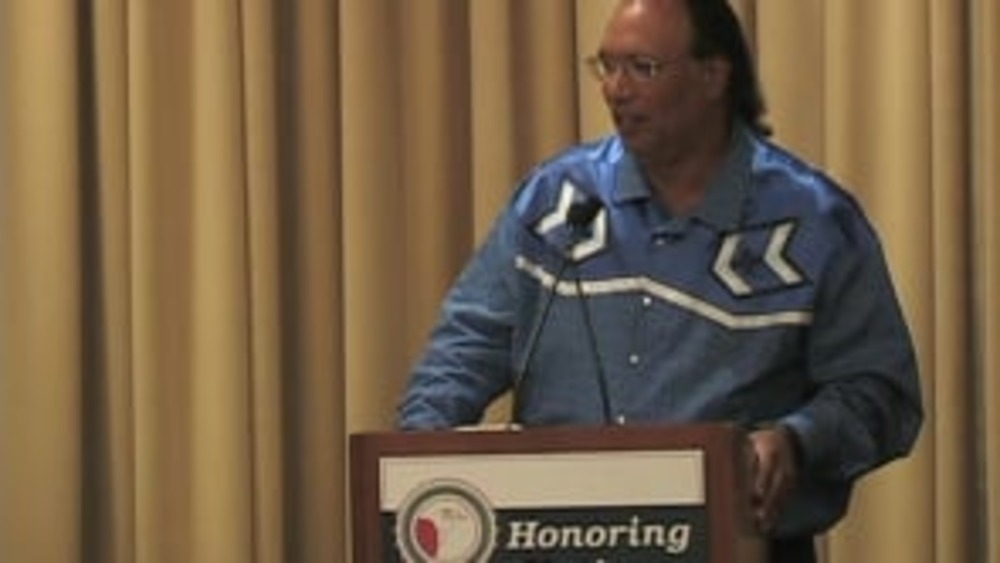Native leaders John McCoy, James R. Gray, and Rick Hill discuss the importance of Native nations joining forces to engage in economic development, and also why it is so important for Native nations and people to buy from their own.
Additional Information
"Sovereignty Today (Q&A)." Honoring Nations symposium. Harvard Project on American Indian Economic Development, John F. Kennedy School of Government, Harvard University. Cambridge, Massachusetts. September 17, 2009. Presentation.
Transcript
Jarvis Williams:
"Hi, my name is Jarvis Williams, I'm with the Kayenta Township. My question is for, I guess it could be for any one of the members, but probably more directed to Mr. McCoy. I was at a conference a couple weeks ago, the Arizona Rural Development Conference, and one of the things that they brought out was the Hispanic purchasing power it has in the State of Arizona. And how if they could market, or tap into that market, that the businesses in Arizona they could actually pull themselves out of the recession. So I'm wondering, since you just made mention about how many economic development studies you guys do, I'm wondering -- and this would probably be addressed to all the panel members -- if you guys had any, read anything about the purchasing power of tribes, of Native people in general. I know from the area that I come from, it's two hours to the nearest place, but all the border towns are doing very well, even during the recession. Construction growth stopped, it slowed, but retail sales kept pace. And a lot of that's probably attributed to a lot of our dollars being leaked off to the border towns. And so I'm wondering if you guys had any insight into that."
John McCoy:
"Retail is tough. We've been successful there at Tulalip. One of the things, during the normal day of the week, we at Tulalip get over 30,000 visitors. During the weekend and holidays, we exceed over 50,000 a day. And most of this is retail and, naturally, gaming. The question was asked earlier about the buying power of tribes. No one tribe has the power to make that happen. We'd have to create a consortium of tribes to work together, almost like the Alaska corporations. A number of them pulled together to create some buying power. That's what we need to take a look at, and we need a number of tribes to be able to pull together to create a joint corporation if you will in order to get the buying power to drive these costs down. [Because] if one tribe does it, they don't have the buying power. And what we need to do to be successful, we've got to be another Walmart -- that big -- in order to get those prices so that we can use the product. So that's how I see it."
James Gray:
"At the Osage Nation we had, we were looking for a way to kind of manage exactly how big of an economic footprint that we have in our community. And we had searched high and low and looked for the person that could actually pull it together that had the right level of expertise, that had a great sense of depth in Indian Country, knowledge from an economic standpoint. And we couldn't find anybody, so we settled for Jonathan Taylor to actually do it. That went over better than the Kennedy jokes. So Jonathan Taylor walks into a bar...! No. We had a really good analysis done, because not only were we able to calculate the royalties that the Osages received from their oil and gas revenues, we also were able to calculate the economic functions of our casinos. We had five casinos at the time, now we have seven. And we also calculated the multiplier factor of the employees that work for the tribe and their expenditures in the economy. And then we also were able to do the direct purchases that the tribe makes in contracting and subcontracting out for a variety of goods and services. So collectively, some really important achievements were made in that report, which was that the total economic impact that the nation had generated was -- this is direct economic impact -- it was $222 million a year. We have also, were able to identify that the nation employed 1,400 people and those individuals -- some lived on reservation, some didn't, so we had to figure that into it -- the royalties that the Osage shareholders received that year was in the neighborhood of like $56 million a year and the purchasing power of the Osage Nation was measured at like $78 million a year. Now if you don't have the context, that doesn't help you much. So what we tried to do, and this is what I think was pretty effective in what Jonathan did in his report, is that he measured us against other large employers in the state's economy. One of the largest employers in the state's economy, in the private world, is Devon Energy, which is a publicly traded company based in Oklahoma City. Also was K-Mart or Target, I think it was. And so in a way, it made it possible for us to not only have empirical information that we could share with others like editorial boards -- the Tulsa World or the Daily Oklahoman -- it also allowed us to have conversation with industry, financial institutions to talk about ways in which we could compete, they could compete for our business -- other goods and contractors that actually delved into a new organization that resulted in a meeting that we have once a year called the Osage Business Owners Conference. And we were trying to build entrepreneurship and try to get people to start their own companies, form under the LLC [limited liability corporation], work with the LLC, form corporations, joint partnerships, but also basically effectively compete for the dollar that the Osage Nation is spending anyway every year.
It spun off a lot of different things. Personnel wise, it gave people a sense that you're working for an organization that's really going somewhere. And it really did charge them up because we went from 200 employees in 2002 to 1,400 in 2007. Now we're like at 1,700 now and that's a lot of, that's covered a lot of ground in a very short period of time. So if you -- but it starts with having that study done and being able to make sure all the records are available to Jonathan, otherwise he will never leave you alone. It took awhile to get it all together, but once we did he was able to plug the numbers, do the analysis and do the reports and present the material for us and it's been extremely well received by everyone in the non-Indian community, as well as our own folks."
Rick Hill:
"On John's remark, it went back to the last panel about the purchasing power thing, that's what needs to happen. They do that in Vegas on the Strip. Everybody buys from one vendor, they get pricing. We're stupid if we don't do it. That's the way that is. I think on the local side, the policy like John says, we write the rules, so Norbert used to do these speeches. When we play in your playground we play by your rules, when you come in our territory and our playground, we need some rules. And part of it's policy. And as the Asian community would say, everything joint venture. Everything, joint venture. So every service and good that purchased needs to have an Indian component. If they don't have that, next. They'll get an Indian division or hire or train or whatever, but to leverage your purchasing power then they can play by your rules. And then measurables on the council side, every quarter it's a certain percentage that's realistic, and then bring your purchasing agents in front of the council and say, 'Did you meet the threshold, if so, you did. If not, why not and what are you going to do to correct that, 'cause we've got to go that extra mile.' I should do these speeches on Indians should act more Jewish. That's one thing they do. They use their own people. If they're going to buy a table or chair or go to a service, they're going to look to their own people first. They're not going to go into another community and use those people. That's what I mean. That's a good thing. We need to use our own people and have confidence in them. Thank you."



